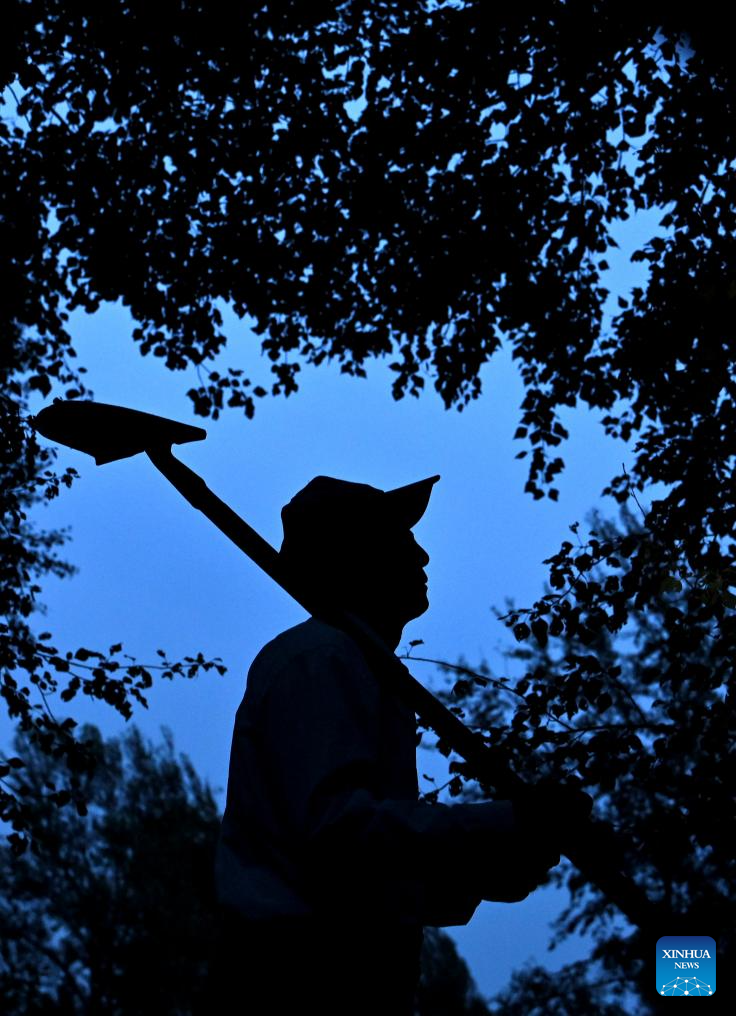
Bai Shun patrols a forest after dinner in Bulteger Gacha, Horqin Left Wing Rear Banner of Tongliao City, north China's Inner Mongolia Autonomous Region, Aug. 2, 2023. Locating in the center of the Horqin Sandy Land, Bulteger Gacha, a small village in Horqin Left Wing Rear Banner of Tongliao City, used to suffer from desertification. Since 2002, Bai Shun, a local Mongolian farmer, has led his family take root in this village and devote themselves to the control of desertification.
The survival rate of planted trees was low at the beginning due to lack of experience and fund. In order to improve the survival rate, Bai Shun sold his possessions to raise money and made every effort in raising saplings, pulling fences, planting sand-fixing grass, patrolling and consulting experts.
With continuous hard work of Bai Shun's family, the sandy land gradually disappeared. In the past 20 years, 1,200 mu (about 80 hectares) of sandy land has been turned into forests, and hundreds of hectares of farmland has been protected.
At the age of 73, Bai Shun still holds high morale in defeating desertification. "Protecting the ecological environment is as important to me as protecting my own life. I want to conquer the sandy land and protect my home," he said. (Xinhua/Cai Yang)
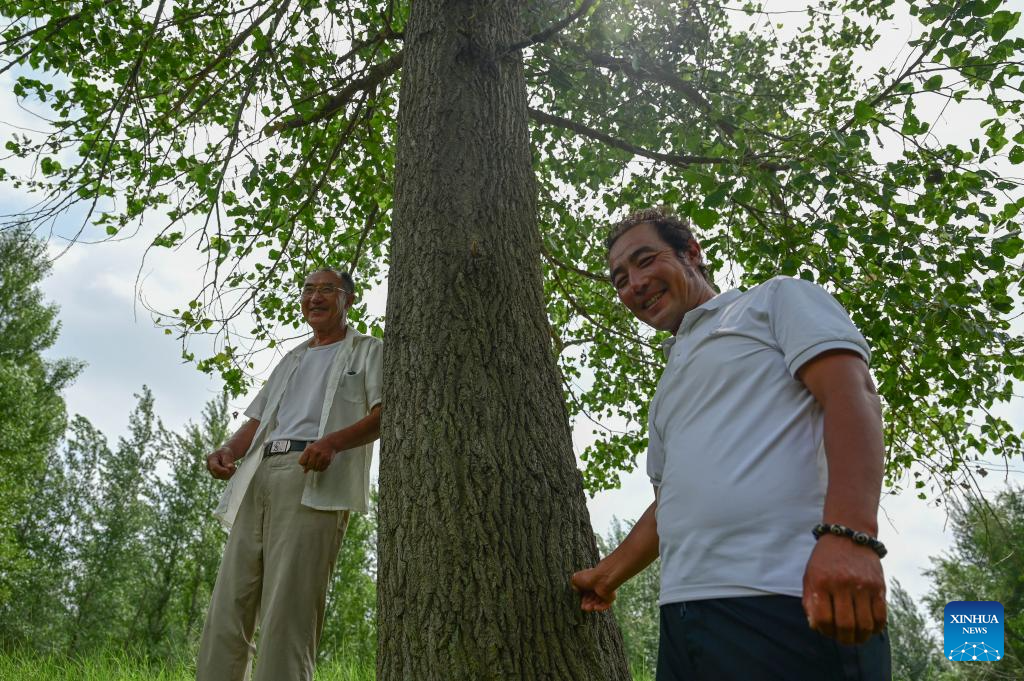
Bai Shun (L) and his son pose for photos with the first tree they planted in Bulteger Gacha, Horqin Left Wing Rear Banner of Tongliao City, north China's Inner Mongolia Autonomous Region, Aug. 2, 2023. Locating in the center of the Horqin Sandy Land, Bulteger Gacha, a small village in Horqin Left Wing Rear Banner of Tongliao City, used to suffer from desertification. Since 2002, Bai Shun, a local Mongolian farmer, has led his family take root in this village and devote themselves to the control of desertification.
The survival rate of planted trees was low at the beginning due to lack of experience and fund. In order to improve the survival rate, Bai Shun sold his possessions to raise money and made every effort in raising saplings, pulling fences, planting sand-fixing grass, patrolling and consulting experts.
With continuous hard work of Bai Shun's family, the sandy land gradually disappeared. In the past 20 years, 1,200 mu (about 80 hectares) of sandy land has been turned into forests, and hundreds of hectares of farmland has been protected.
At the age of 73, Bai Shun still holds high morale in defeating desertification. "Protecting the ecological environment is as important to me as protecting my own life. I want to conquer the sandy land and protect my home," he said. (Xinhua/Lian Zhen)
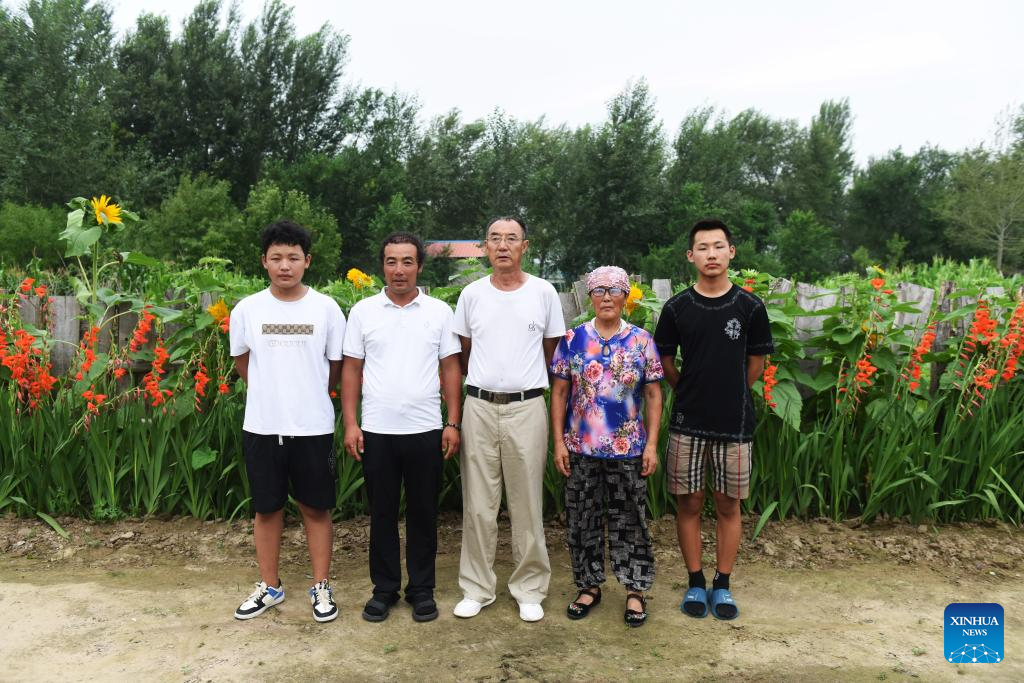
Bai Shun (C) poses for photos with his family in Bulteger Gacha, Horqin Left Wing Rear Banner of Tongliao City, north China's Inner Mongolia Autonomous Region, Aug. 2, 2023. Locating in the center of the Horqin Sandy Land, Bulteger Gacha, a small village in Horqin Left Wing Rear Banner of Tongliao City, used to suffer from desertification. Since 2002, Bai Shun, a local Mongolian farmer, has led his family take root in this village and devote themselves to the control of desertification.
The survival rate of planted trees was low at the beginning due to lack of experience and fund. In order to improve the survival rate, Bai Shun sold his possessions to raise money and made every effort in raising saplings, pulling fences, planting sand-fixing grass, patrolling and consulting experts.
With continuous hard work of Bai Shun's family, the sandy land gradually disappeared. In the past 20 years, 1,200 mu (about 80 hectares) of sandy land has been turned into forests, and hundreds of hectares of farmland has been protected.
At the age of 73, Bai Shun still holds high morale in defeating desertification. "Protecting the ecological environment is as important to me as protecting my own life. I want to conquer the sandy land and protect my home," he said. (Xinhua/Huang Xiaoyong)
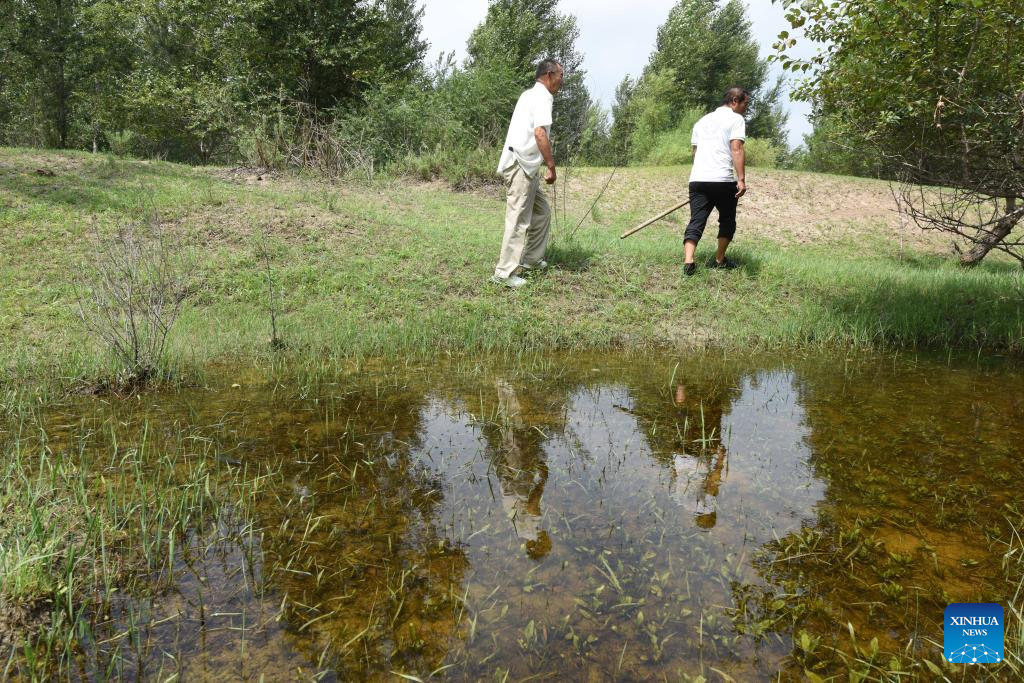
Bai Shun (L) and his son patrol a forest in Bulteger Gacha, Horqin Left Wing Rear Banner of Tongliao City, north China's Inner Mongolia Autonomous Region, Aug. 2, 2023. Locating in the center of the Horqin Sandy Land, Bulteger Gacha, a small village in Horqin Left Wing Rear Banner of Tongliao City, used to suffer from desertification. Since 2002, Bai Shun, a local Mongolian farmer, has led his family take root in this village and devote themselves to the control of desertification.
The survival rate of planted trees was low at the beginning due to lack of experience and fund. In order to improve the survival rate, Bai Shun sold his possessions to raise money and made every effort in raising saplings, pulling fences, planting sand-fixing grass, patrolling and consulting experts.
With continuous hard work of Bai Shun's family, the sandy land gradually disappeared. In the past 20 years, 1,200 mu (about 80 hectares) of sandy land has been turned into forests, and hundreds of hectares of farmland has been protected.
At the age of 73, Bai Shun still holds high morale in defeating desertification. "Protecting the ecological environment is as important to me as protecting my own life. I want to conquer the sandy land and protect my home," he said. (Xinhua/Huang Xiaoyong)
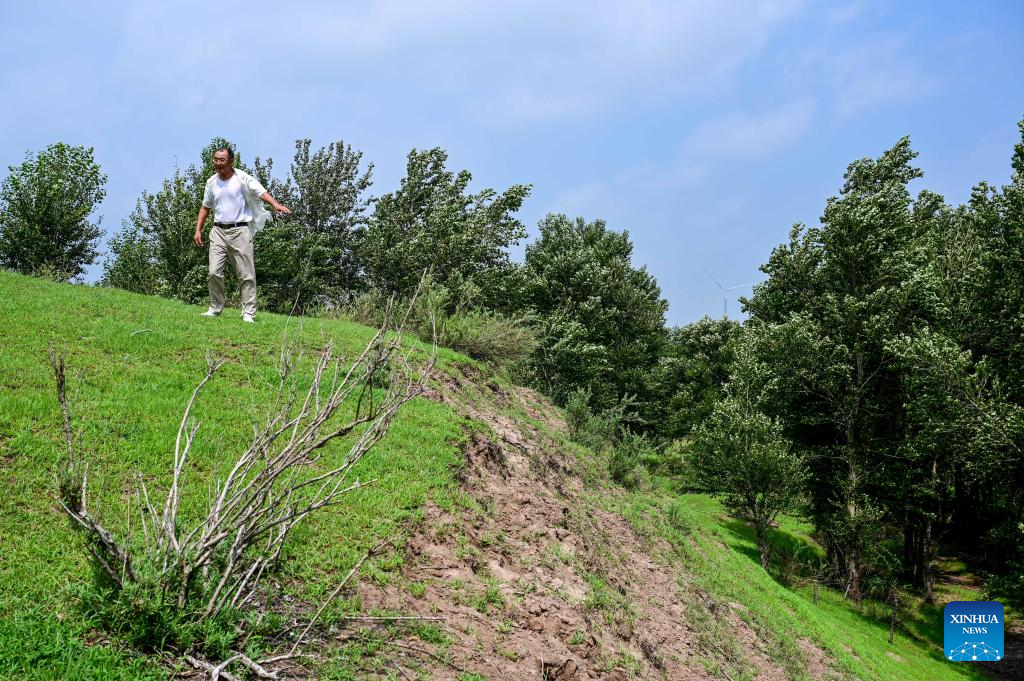
Bai Shun talks about his sand control experience on a meadow in Bulteger Gacha, Horqin Left Wing Rear Banner of Tongliao City, north China's Inner Mongolia Autonomous Region, Aug. 2, 2023. Locating in the center of the Horqin Sandy Land, Bulteger Gacha, a small village in Horqin Left Wing Rear Banner of Tongliao City, used to suffer from desertification. Since 2002, Bai Shun, a local Mongolian farmer, has led his family take root in this village and devote themselves to the control of desertification.
The survival rate of planted trees was low at the beginning due to lack of experience and fund. In order to improve the survival rate, Bai Shun sold his possessions to raise money and made every effort in raising saplings, pulling fences, planting sand-fixing grass, patrolling and consulting experts.
With continuous hard work of Bai Shun's family, the sandy land gradually disappeared. In the past 20 years, 1,200 mu (about 80 hectares) of sandy land has been turned into forests, and hundreds of hectares of farmland has been protected.
At the age of 73, Bai Shun still holds high morale in defeating desertification. "Protecting the ecological environment is as important to me as protecting my own life. I want to conquer the sandy land and protect my home," he said. (Xinhua/Lian Zhen)
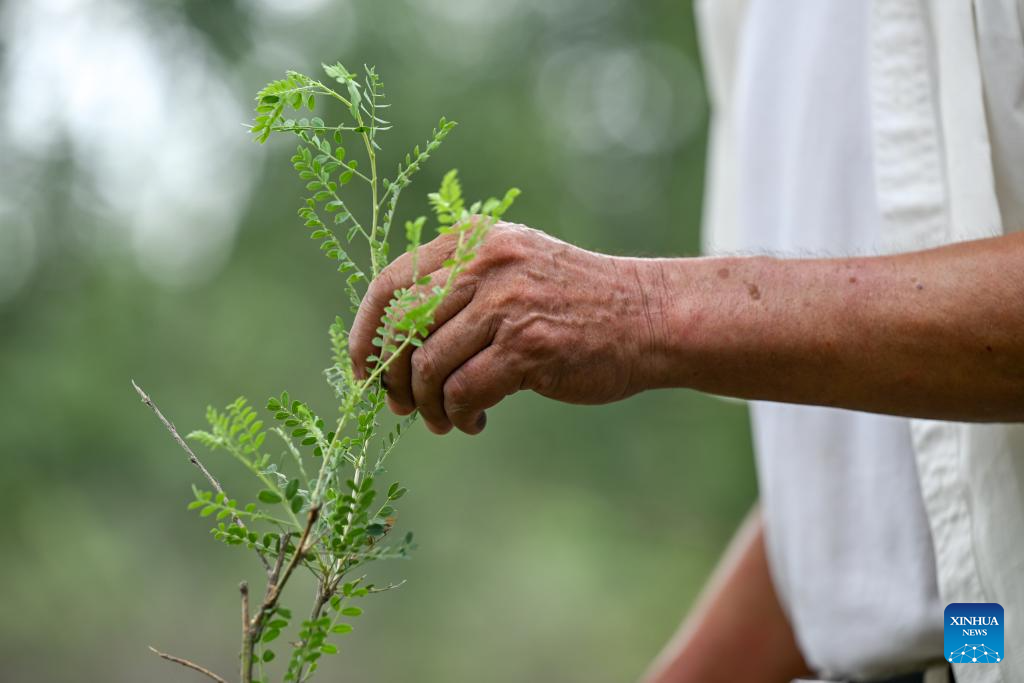
Bai Shun touches a Caragana plant in Bulteger Gacha, Horqin Left Wing Rear Banner of Tongliao City, north China's Inner Mongolia Autonomous Region, Aug. 2, 2023. Locating in the center of the Horqin Sandy Land, Bulteger Gacha, a small village in Horqin Left Wing Rear Banner of Tongliao City, used to suffer from desertification. Since 2002, Bai Shun, a local Mongolian farmer, has led his family take root in this village and devote themselves to the control of desertification.
The survival rate of planted trees was low at the beginning due to lack of experience and fund. In order to improve the survival rate, Bai Shun sold his possessions to raise money and made every effort in raising saplings, pulling fences, planting sand-fixing grass, patrolling and consulting experts.
With continuous hard work of Bai Shun's family, the sandy land gradually disappeared. In the past 20 years, 1,200 mu (about 80 hectares) of sandy land has been turned into forests, and hundreds of hectares of farmland has been protected.
At the age of 73, Bai Shun still holds high morale in defeating desertification. "Protecting the ecological environment is as important to me as protecting my own life. I want to conquer the sandy land and protect my home," he said. (Xinhua/Lian Zhen)
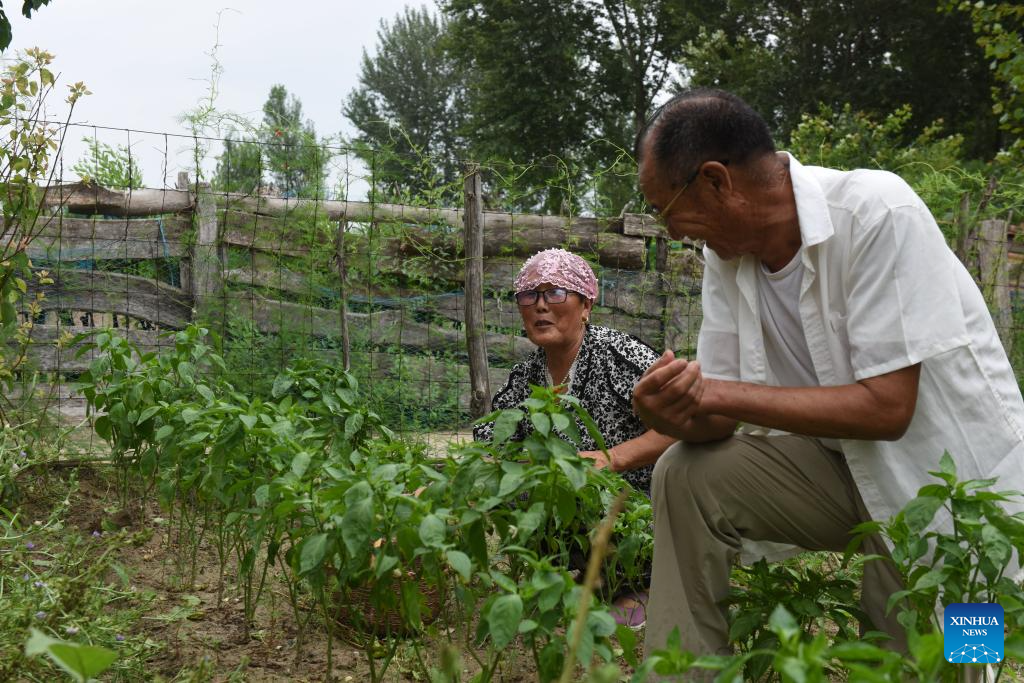
Bai Shun (R) and his wife work in the vegetable garden of their house in Bulteger Gacha, Horqin Left Wing Rear Banner of Tongliao City, north China's Inner Mongolia Autonomous Region, Aug. 2, 2023. Locating in the center of the Horqin Sandy Land, Bulteger Gacha, a small village in Horqin Left Wing Rear Banner of Tongliao City, used to suffer from desertification. Since 2002, Bai Shun, a local Mongolian farmer, has led his family take root in this village and devote themselves to the control of desertification.
The survival rate of planted trees was low at the beginning due to lack of experience and fund. In order to improve the survival rate, Bai Shun sold his possessions to raise money and made every effort in raising saplings, pulling fences, planting sand-fixing grass, patrolling and consulting experts.
With continuous hard work of Bai Shun's family, the sandy land gradually disappeared. In the past 20 years, 1,200 mu (about 80 hectares) of sandy land has been turned into forests, and hundreds of hectares of farmland has been protected.
At the age of 73, Bai Shun still holds high morale in defeating desertification. "Protecting the ecological environment is as important to me as protecting my own life. I want to conquer the sandy land and protect my home," he said. (Xinhua/Huang Xiaoyong)
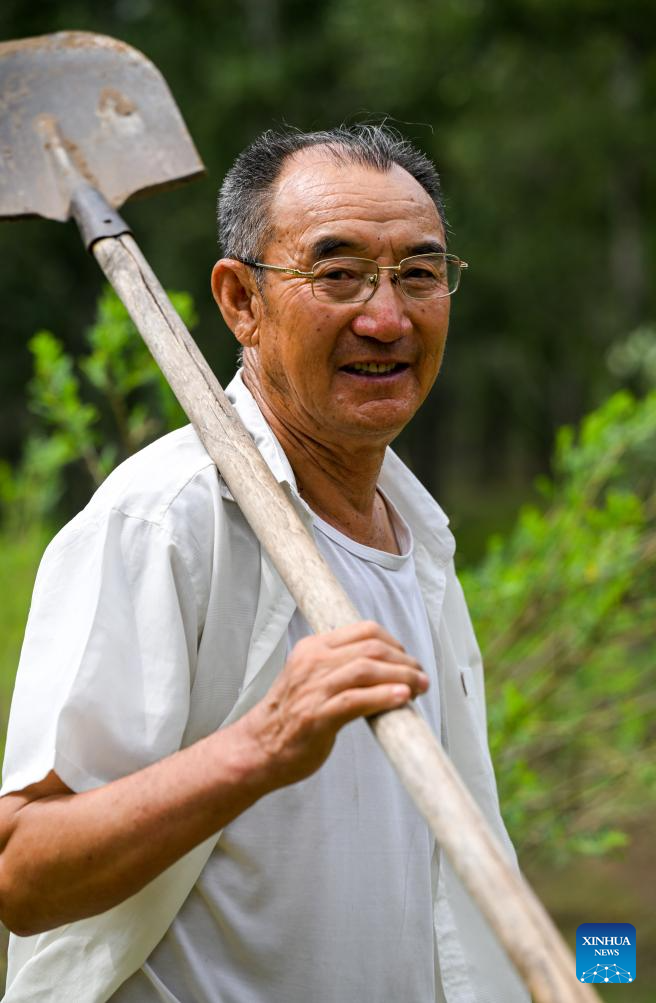
Bai Shun poses for photos in Bulteger Gacha, Horqin Left Wing Rear Banner of Tongliao City, north China's Inner Mongolia Autonomous Region, Aug. 2, 2023. Locating in the center of the Horqin Sandy Land, Bulteger Gacha, a small village in Horqin Left Wing Rear Banner of Tongliao City, used to suffer from desertification. Since 2002, Bai Shun, a local Mongolian farmer, has led his family take root in this village and devote themselves to the control of desertification.
The survival rate of planted trees was low at the beginning due to lack of experience and fund. In order to improve the survival rate, Bai Shun sold his possessions to raise money and made every effort in raising saplings, pulling fences, planting sand-fixing grass, patrolling and consulting experts.
With continuous hard work of Bai Shun's family, the sandy land gradually disappeared. In the past 20 years, 1,200 mu (about 80 hectares) of sandy land has been turned into forests, and hundreds of hectares of farmland has been protected.
At the age of 73, Bai Shun still holds high morale in defeating desertification. "Protecting the ecological environment is as important to me as protecting my own life. I want to conquer the sandy land and protect my home," he said. (Xinhua/Lian Zhen)
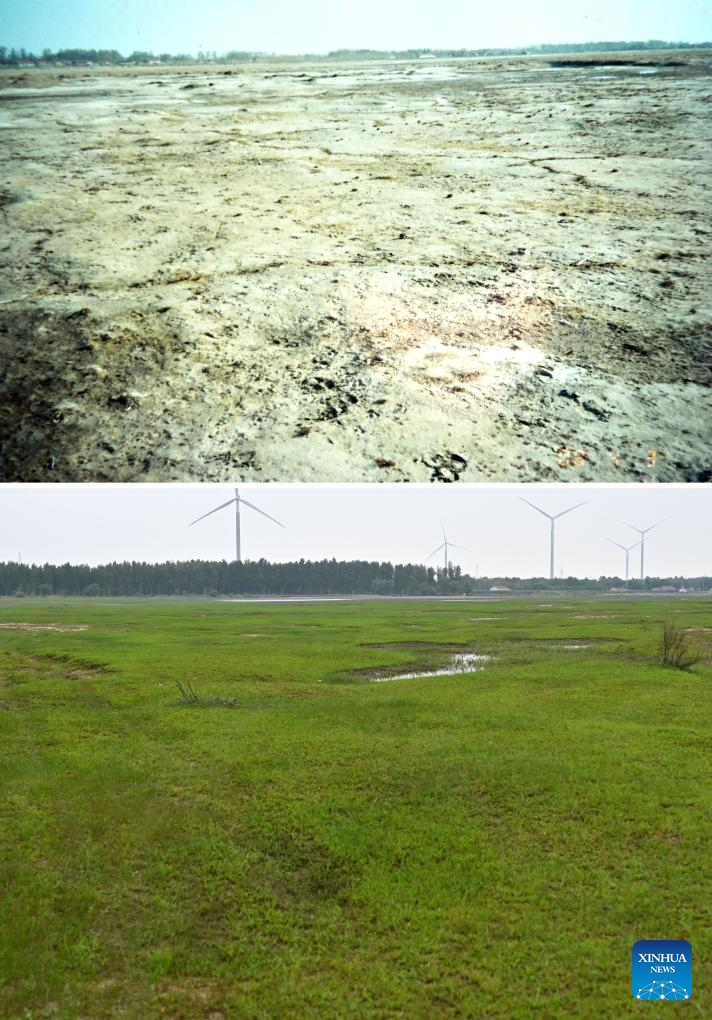
This combo photo shows the sandy land before sand control in Bulteger Gacha, Horqin Left Wing Rear Banner of Tongliao City, north China's Inner Mongolia Autonomous Region in 2008 (above, file photo) and the meadow in front of Bai Shun's house in Bulteger Gacha, Horqin Left Wing Rear Banner of Tongliao City, north China's Inner Mongolia Autonomous Region, Aug. 2, 2023 (below, photo taken by Xinhua photographer Huang Xiaoyong). Locating in the center of the Horqin Sandy Land, Bulteger Gacha, a small village in Horqin Left Wing Rear Banner of Tongliao City, used to suffer from desertification. Since 2002, Bai Shun, a local Mongolian farmer, has led his family take root in this village and devote themselves to the control of desertification.
The survival rate of planted trees was low at the beginning due to lack of experience and fund. In order to improve the survival rate, Bai Shun sold his possessions to raise money and made every effort in raising saplings, pulling fences, planting sand-fixing grass, patrolling and consulting experts.
With continuous hard work of Bai Shun's family, the sandy land gradually disappeared. In the past 20 years, 1,200 mu (about 80 hectares) of sandy land has been turned into forests, and hundreds of hectares of farmland has been protected.
At the age of 73, Bai Shun still holds high morale in defeating desertification. "Protecting the ecological environment is as important to me as protecting my own life. I want to conquer the sandy land and protect my home," he said. (Xinhua)
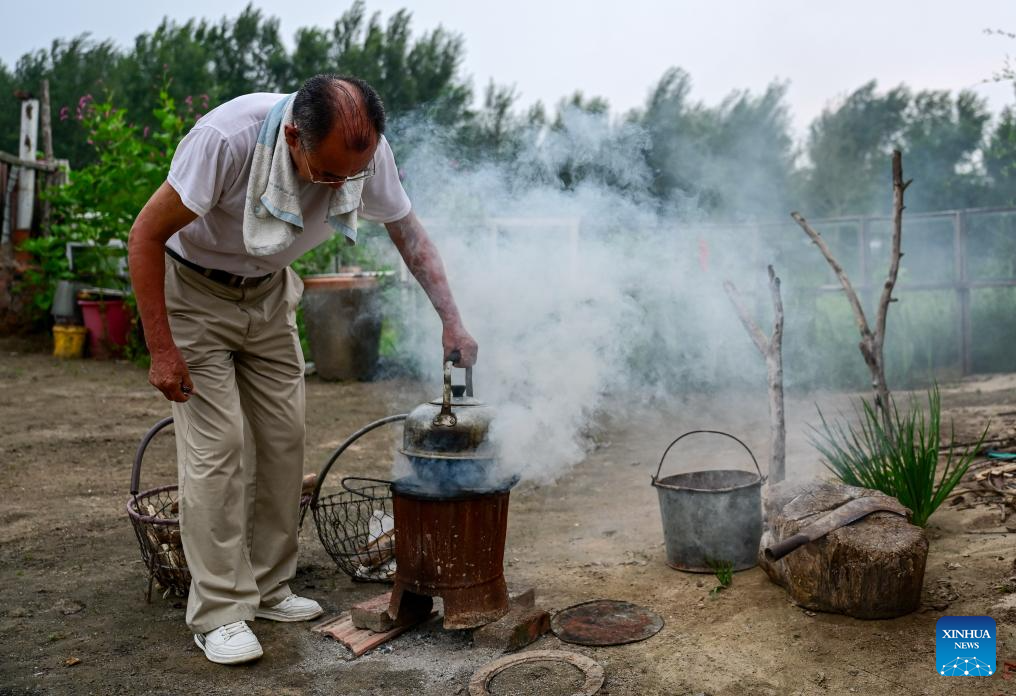
Bai Shun boils water at his house in Bulteger Gacha, Horqin Left Wing Rear Banner of Tongliao City, north China's Inner Mongolia Autonomous Region, Aug. 2, 2023. Locating in the center of the Horqin Sandy Land, Bulteger Gacha, a small village in Horqin Left Wing Rear Banner of Tongliao City, used to suffer from desertification. Since 2002, Bai Shun, a local Mongolian farmer, has led his family take root in this village and devote themselves to the control of desertification.
The survival rate of planted trees was low at the beginning due to lack of experience and fund. In order to improve the survival rate, Bai Shun sold his possessions to raise money and made every effort in raising saplings, pulling fences, planting sand-fixing grass, patrolling and consulting experts.
With continuous hard work of Bai Shun's family, the sandy land gradually disappeared. In the past 20 years, 1,200 mu (about 80 hectares) of sandy land has been turned into forests, and hundreds of hectares of farmland has been protected.
At the age of 73, Bai Shun still holds high morale in defeating desertification. "Protecting the ecological environment is as important to me as protecting my own life. I want to conquer the sandy land and protect my home," he said. (Xinhua/Lian Zhen)
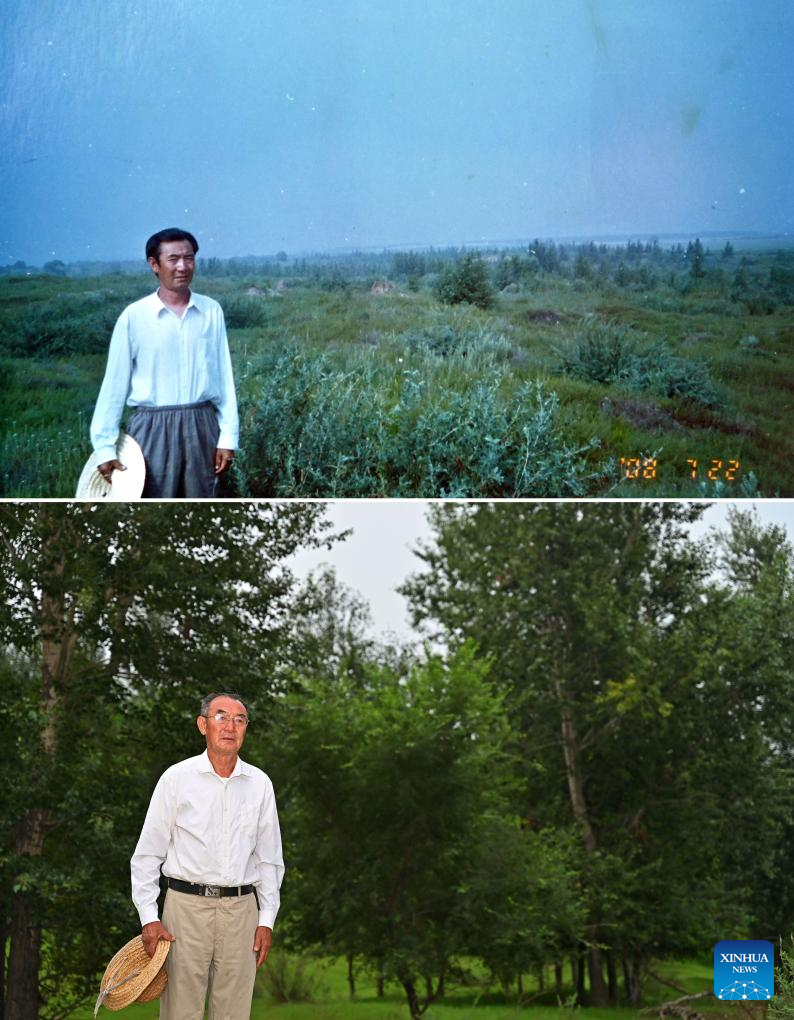
This combo photo shows Bai Shun posing for photos in Bulteger Gacha, Horqin Left Wing Rear Banner of Tongliao City, north China's Inner Mongolia Autonomous Region in 2008 (above, file photo) and him posing for photos in front of a forest in Bulteger Gacha, Horqin Left Wing Rear Banner of Tongliao City, north China's Inner Mongolia Autonomous Region, Aug. 2, 2023 (below, photo taken by Xinhua photographer Lian Zhen). Locating in the center of the Horqin Sandy Land, Bulteger Gacha, a small village in Horqin Left Wing Rear Banner of Tongliao City, used to suffer from desertification. Since 2002, Bai Shun, a local Mongolian farmer, has led his family take root in this village and devote themselves to the control of desertification.
The survival rate of planted trees was low at the beginning due to lack of experience and fund. In order to improve the survival rate, Bai Shun sold his possessions to raise money and made every effort in raising saplings, pulling fences, planting sand-fixing grass, patrolling and consulting experts.
With continuous hard work of Bai Shun's family, the sandy land gradually disappeared. In the past 20 years, 1,200 mu (about 80 hectares) of sandy land has been turned into forests, and hundreds of hectares of farmland has been protected.
At the age of 73, Bai Shun still holds high morale in defeating desertification. "Protecting the ecological environment is as important to me as protecting my own life. I want to conquer the sandy land and protect my home," he said. (Xinhua)
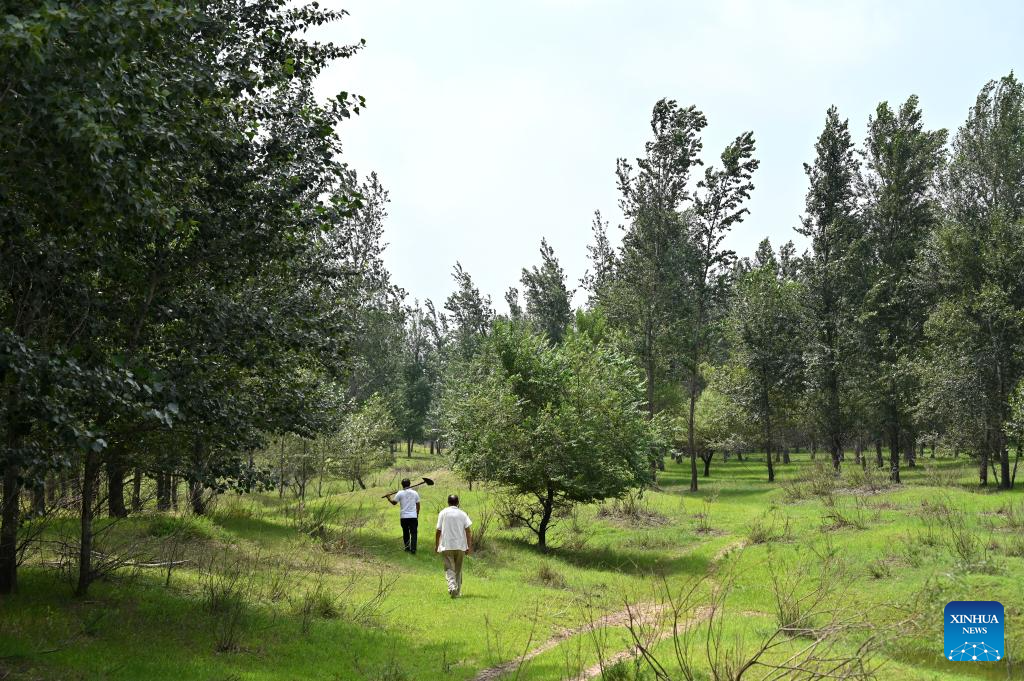
Bai Shun (R) and his son patrol a forest in Bulteger Gacha, Horqin Left Wing Rear Banner of Tongliao City, north China's Inner Mongolia Autonomous Region, Aug. 2, 2023. Locating in the center of the Horqin Sandy Land, Bulteger Gacha, a small village in Horqin Left Wing Rear Banner of Tongliao City, used to suffer from desertification. Since 2002, Bai Shun, a local Mongolian farmer, has led his family take root in this village and devote themselves to the control of desertification.
The survival rate of planted trees was low at the beginning due to lack of experience and fund. In order to improve the survival rate, Bai Shun sold his possessions to raise money and made every effort in raising saplings, pulling fences, planting sand-fixing grass, patrolling and consulting experts.
With continuous hard work of Bai Shun's family, the sandy land gradually disappeared. In the past 20 years, 1,200 mu (about 80 hectares) of sandy land has been turned into forests, and hundreds of hectares of farmland has been protected.
At the age of 73, Bai Shun still holds high morale in defeating desertification. "Protecting the ecological environment is as important to me as protecting my own life. I want to conquer the sandy land and protect my home," he said. (Xinhua/Cai Yang)
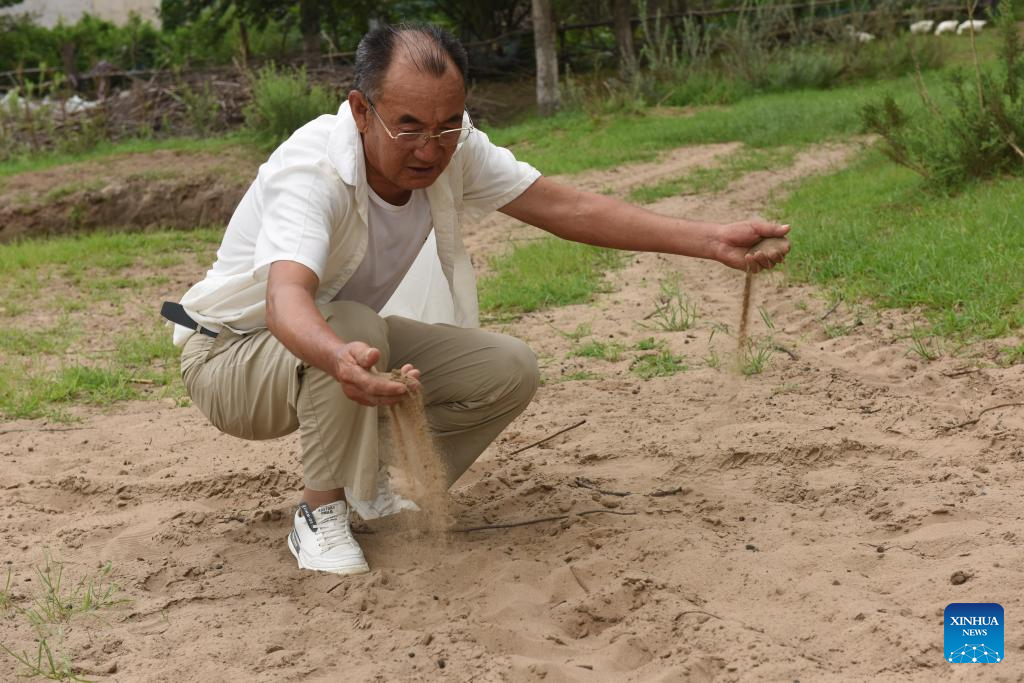
Bai Shun squats on a path in a forest, where used to be sandy, in Bulteger Gacha, Horqin Left Wing Rear Banner of Tongliao City, north China's Inner Mongolia Autonomous Region, Aug. 2, 2023. Locating in the center of the Horqin Sandy Land, Bulteger Gacha, a small village in Horqin Left Wing Rear Banner of Tongliao City, used to suffer from desertification. Since 2002, Bai Shun, a local Mongolian farmer, has led his family take root in this village and devote themselves to the control of desertification.
The survival rate of planted trees was low at the beginning due to lack of experience and fund. In order to improve the survival rate, Bai Shun sold his possessions to raise money and made every effort in raising saplings, pulling fences, planting sand-fixing grass, patrolling and consulting experts.
With continuous hard work of Bai Shun's family, the sandy land gradually disappeared. In the past 20 years, 1,200 mu (about 80 hectares) of sandy land has been turned into forests, and hundreds of hectares of farmland has been protected.
At the age of 73, Bai Shun still holds high morale in defeating desertification. "Protecting the ecological environment is as important to me as protecting my own life. I want to conquer the sandy land and protect my home," he said. (Xinhua/Huang Xiaoyong)
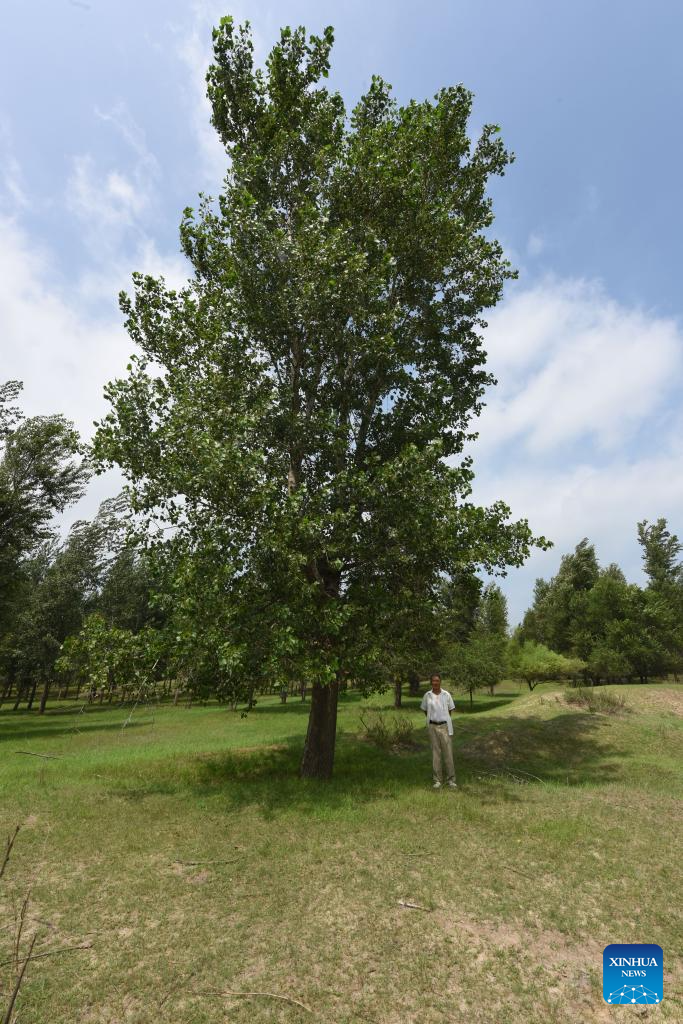
Bai Shun poses for photos with the first tree he planted in Bulteger Gacha, Horqin Left Wing Rear Banner of Tongliao City, north China's Inner Mongolia Autonomous Region, Aug. 2, 2023. Locating in the center of the Horqin Sandy Land, Bulteger Gacha, a small village in Horqin Left Wing Rear Banner of Tongliao City, used to suffer from desertification. Since 2002, Bai Shun, a local Mongolian farmer, has led his family take root in this village and devote themselves to the control of desertification.
The survival rate of planted trees was low at the beginning due to lack of experience and fund. In order to improve the survival rate, Bai Shun sold his possessions to raise money and made every effort in raising saplings, pulling fences, planting sand-fixing grass, patrolling and consulting experts.
With continuous hard work of Bai Shun's family, the sandy land gradually disappeared. In the past 20 years, 1,200 mu (about 80 hectares) of sandy land has been turned into forests, and hundreds of hectares of farmland has been protected.
At the age of 73, Bai Shun still holds high morale in defeating desertification. "Protecting the ecological environment is as important to me as protecting my own life. I want to conquer the sandy land and protect my home," he said. (Xinhua/Huang Xiaoyong)
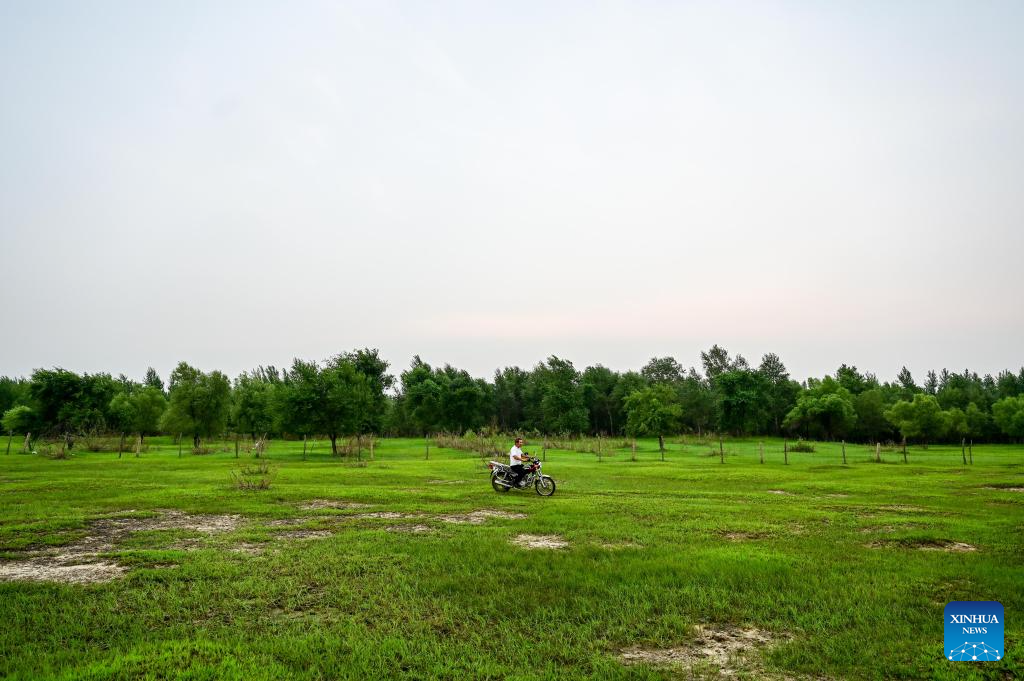
Bai Shun's son patrols a forest in Bulteger Gacha, Horqin Left Wing Rear Banner of Tongliao City, north China's Inner Mongolia Autonomous Region, Aug. 2, 2023. Locating in the center of the Horqin Sandy Land, Bulteger Gacha, a small village in Horqin Left Wing Rear Banner of Tongliao City, used to suffer from desertification. Since 2002, Bai Shun, a local Mongolian farmer, has led his family take root in this village and devote themselves to the control of desertification.
The survival rate of planted trees was low at the beginning due to lack of experience and fund. In order to improve the survival rate, Bai Shun sold his possessions to raise money and made every effort in raising saplings, pulling fences, planting sand-fixing grass, patrolling and consulting experts.
With continuous hard work of Bai Shun's family, the sandy land gradually disappeared. In the past 20 years, 1,200 mu (about 80 hectares) of sandy land has been turned into forests, and hundreds of hectares of farmland has been protected.
At the age of 73, Bai Shun still holds high morale in defeating desertification. "Protecting the ecological environment is as important to me as protecting my own life. I want to conquer the sandy land and protect my home," he said. (Xinhua/Lian Zhen)
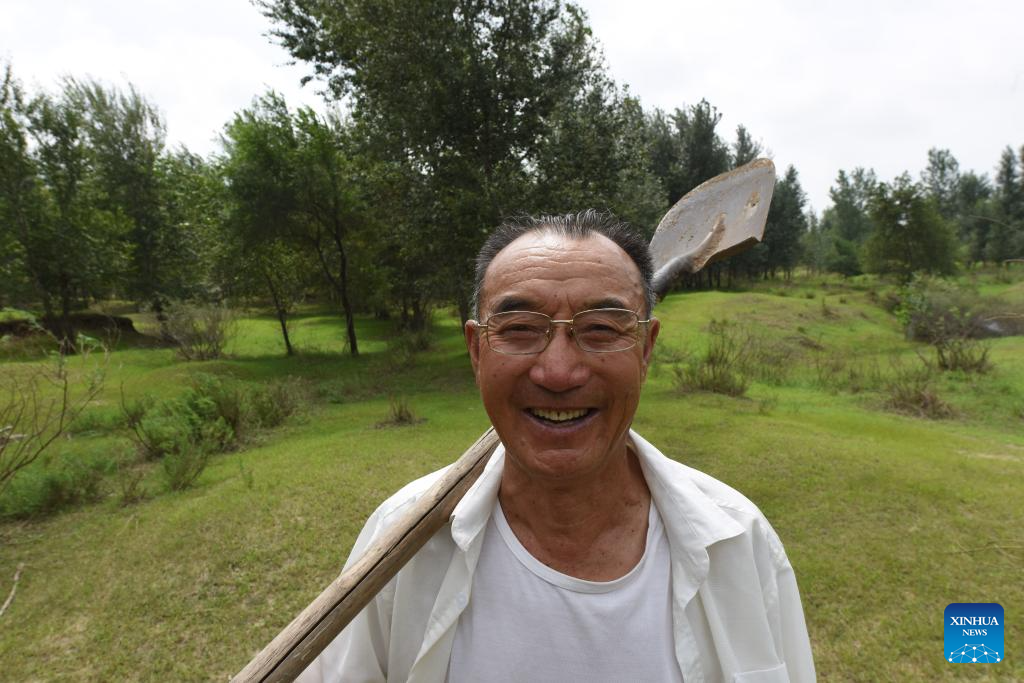
Bai Shun poses for photos in the forest he planted in Bulteger Gacha, Horqin Left Wing Rear Banner of Tongliao City, north China's Inner Mongolia Autonomous Region, Aug. 2, 2023. Locating in the center of the Horqin Sandy Land, Bulteger Gacha, a small village in Horqin Left Wing Rear Banner of Tongliao City, used to suffer from desertification. Since 2002, Bai Shun, a local Mongolian farmer, has led his family take root in this village and devote themselves to the control of desertification.
The survival rate of planted trees was low at the beginning due to lack of experience and fund. In order to improve the survival rate, Bai Shun sold his possessions to raise money and made every effort in raising saplings, pulling fences, planting sand-fixing grass, patrolling and consulting experts.
With continuous hard work of Bai Shun's family, the sandy land gradually disappeared. In the past 20 years, 1,200 mu (about 80 hectares) of sandy land has been turned into forests, and hundreds of hectares of farmland has been protected.
At the age of 73, Bai Shun still holds high morale in defeating desertification. "Protecting the ecological environment is as important to me as protecting my own life. I want to conquer the sandy land and protect my home," he said. (Xinhua/Huang Xiaoyong)
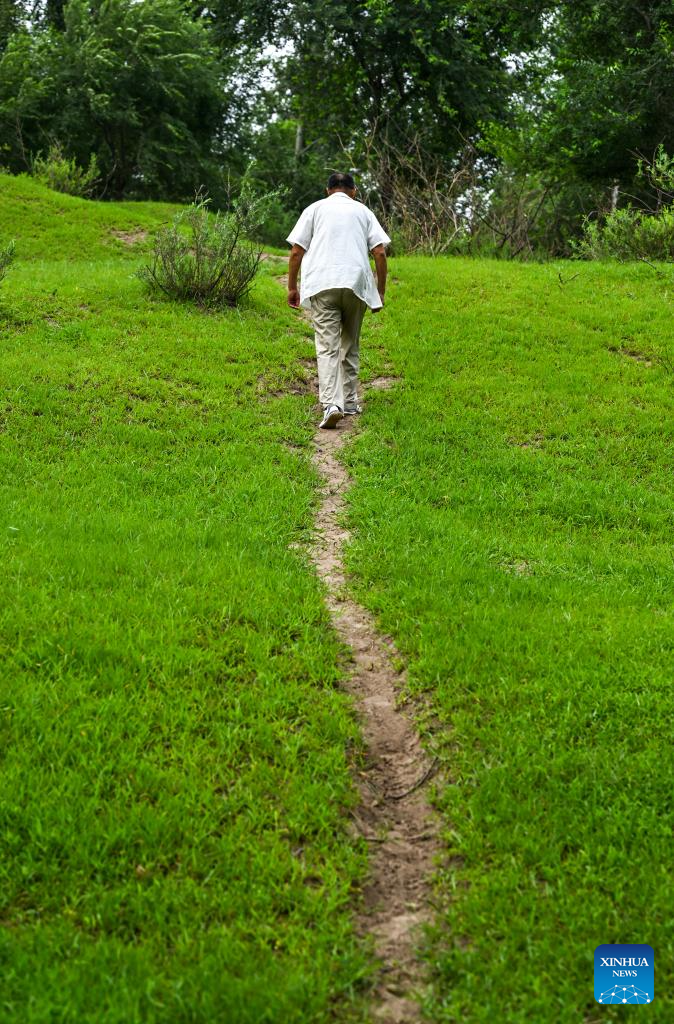
Bai Shun walks on a path to a forest in Bulteger Gacha, Horqin Left Wing Rear Banner of Tongliao City, north China's Inner Mongolia Autonomous Region, Aug. 2, 2023. Locating in the center of the Horqin Sandy Land, Bulteger Gacha, a small village in Horqin Left Wing Rear Banner of Tongliao City, used to suffer from desertification. Since 2002, Bai Shun, a local Mongolian farmer, has led his family take root in this village and devote themselves to the control of desertification.
The survival rate of planted trees was low at the beginning due to lack of experience and fund. In order to improve the survival rate, Bai Shun sold his possessions to raise money and made every effort in raising saplings, pulling fences, planting sand-fixing grass, patrolling and consulting experts.
With continuous hard work of Bai Shun's family, the sandy land gradually disappeared. In the past 20 years, 1,200 mu (about 80 hectares) of sandy land has been turned into forests, and hundreds of hectares of farmland has been protected.
At the age of 73, Bai Shun still holds high morale in defeating desertification. "Protecting the ecological environment is as important to me as protecting my own life. I want to conquer the sandy land and protect my home," he said. (Xinhua/Lian Zhen)
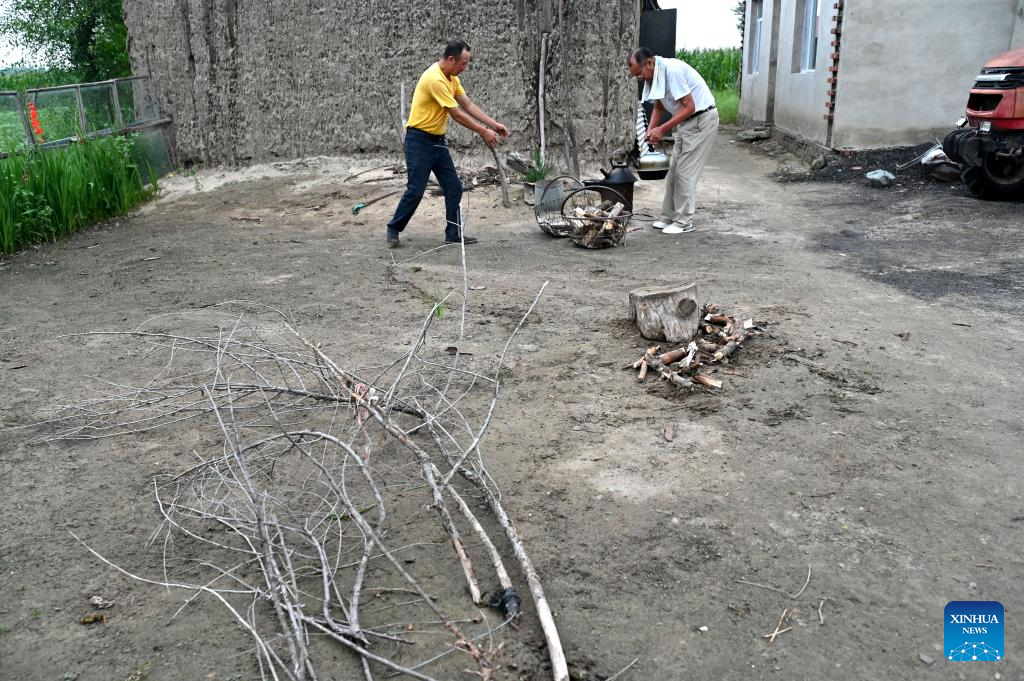
Bai Shun (R) boils water at his house in Bulteger Gacha, Horqin Left Wing Rear Banner of Tongliao City, north China's Inner Mongolia Autonomous Region, Aug. 2, 2023. Locating in the center of the Horqin Sandy Land, Bulteger Gacha, a small village in Horqin Left Wing Rear Banner of Tongliao City, used to suffer from desertification. Since 2002, Bai Shun, a local Mongolian farmer, has led his family take root in this village and devote themselves to the control of desertification.
The survival rate of planted trees was low at the beginning due to lack of experience and fund. In order to improve the survival rate, Bai Shun sold his possessions to raise money and made every effort in raising saplings, pulling fences, planting sand-fixing grass, patrolling and consulting experts.
With continuous hard work of Bai Shun's family, the sandy land gradually disappeared. In the past 20 years, 1,200 mu (about 80 hectares) of sandy land has been turned into forests, and hundreds of hectares of farmland has been protected.
At the age of 73, Bai Shun still holds high morale in defeating desertification. "Protecting the ecological environment is as important to me as protecting my own life. I want to conquer the sandy land and protect my home," he said. (Xinhua/Cai Yang)
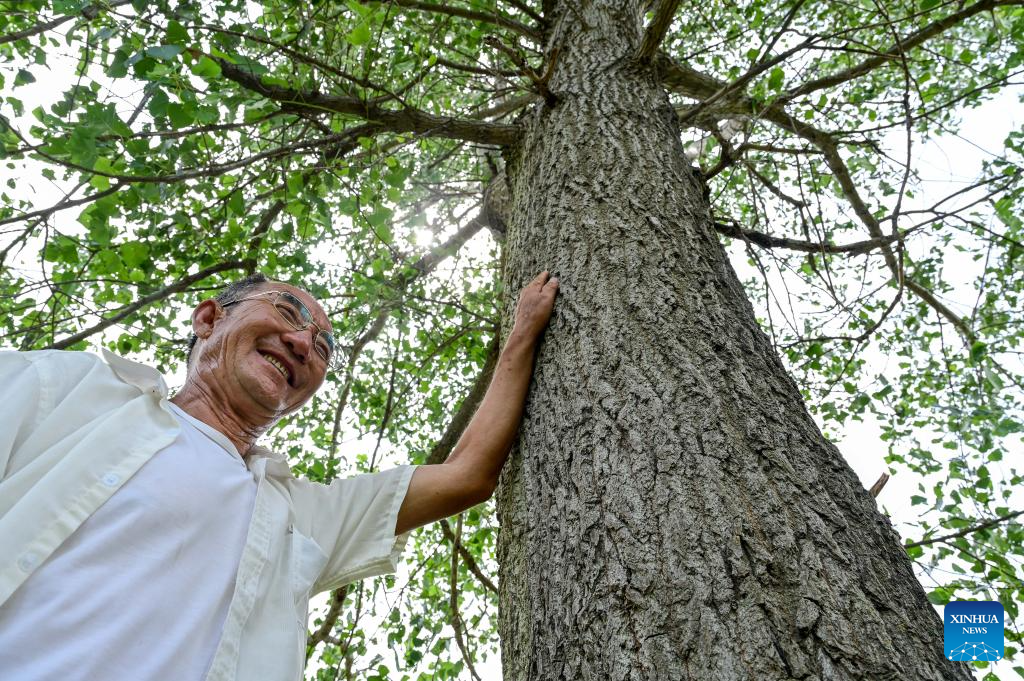
Bai Shun touches the first tree he planted in Bulteger Gacha, Horqin Left Wing Rear Banner of Tongliao City, north China's Inner Mongolia Autonomous Region, Aug. 2, 2023. Locating in the center of the Horqin Sandy Land, Bulteger Gacha, a small village in Horqin Left Wing Rear Banner of Tongliao City, used to suffer from desertification. Since 2002, Bai Shun, a local Mongolian farmer, has led his family take root in this village and devote themselves to the control of desertification.
The survival rate of planted trees was low at the beginning due to lack of experience and fund. In order to improve the survival rate, Bai Shun sold his possessions to raise money and made every effort in raising saplings, pulling fences, planting sand-fixing grass, patrolling and consulting experts.
With continuous hard work of Bai Shun's family, the sandy land gradually disappeared. In the past 20 years, 1,200 mu (about 80 hectares) of sandy land has been turned into forests, and hundreds of hectares of farmland has been protected.
At the age of 73, Bai Shun still holds high morale in defeating desertification. "Protecting the ecological environment is as important to me as protecting my own life. I want to conquer the sandy land and protect my home," he said. (Xinhua/Lian Zhen)
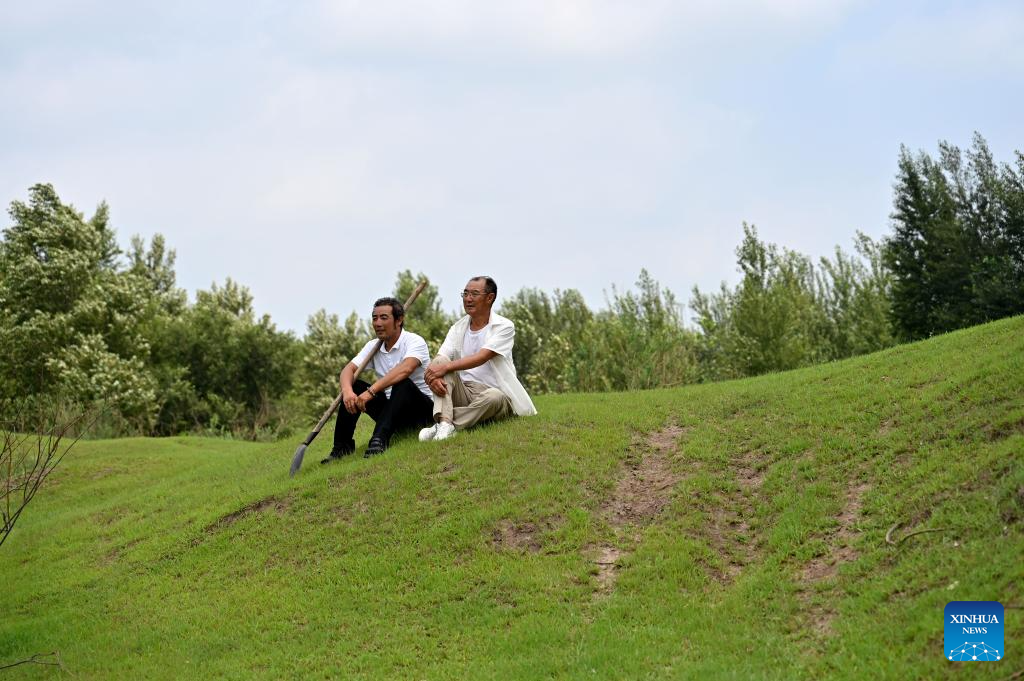
Bai Shun (R) and his son rest on a meadow in Bulteger Gacha, Horqin Left Wing Rear Banner of Tongliao City, north China's Inner Mongolia Autonomous Region, Aug. 2, 2023. Locating in the center of the Horqin Sandy Land, Bulteger Gacha, a small village in Horqin Left Wing Rear Banner of Tongliao City, used to suffer from desertification. Since 2002, Bai Shun, a local Mongolian farmer, has led his family take root in this village and devote themselves to the control of desertification.
The survival rate of planted trees was low at the beginning due to lack of experience and fund. In order to improve the survival rate, Bai Shun sold his possessions to raise money and made every effort in raising saplings, pulling fences, planting sand-fixing grass, patrolling and consulting experts.
With continuous hard work of Bai Shun's family, the sandy land gradually disappeared. In the past 20 years, 1,200 mu (about 80 hectares) of sandy land has been turned into forests, and hundreds of hectares of farmland has been protected.
At the age of 73, Bai Shun still holds high morale in defeating desertification. "Protecting the ecological environment is as important to me as protecting my own life. I want to conquer the sandy land and protect my home," he said. (Xinhua/Cai Yang)
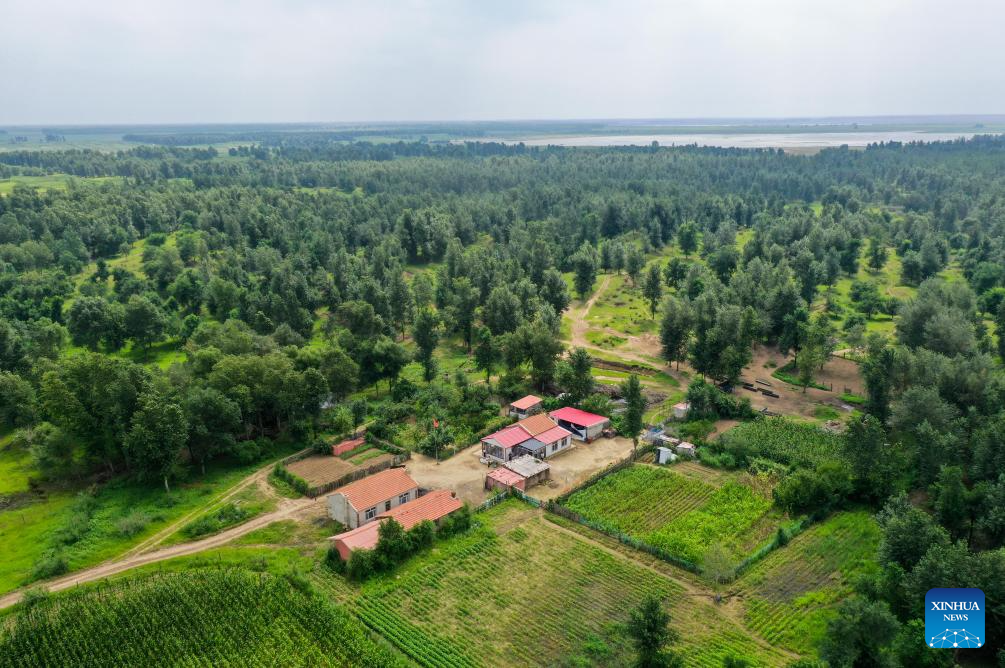
This aerial photo taken on Aug. 2, 2023 shows the house of Bai Shun in Bulteger Gacha, Horqin Left Wing Rear Banner of Tongliao City, north China's Inner Mongolia Autonomous Region. Locating in the center of the Horqin Sandy Land, Bulteger Gacha, a small village in Horqin Left Wing Rear Banner of Tongliao City, used to suffer from desertification. Since 2002, Bai Shun, a local Mongolian farmer, has led his family take root in this village and devote themselves to the control of desertification.
The survival rate of planted trees was low at the beginning due to lack of experience and fund. In order to improve the survival rate, Bai Shun sold his possessions to raise money and made every effort in raising saplings, pulling fences, planting sand-fixing grass, patrolling and consulting experts.
With continuous hard work of Bai Shun's family, the sandy land gradually disappeared. In the past 20 years, 1,200 mu (about 80 hectares) of sandy land has been turned into forests, and hundreds of hectares of farmland has been protected.
At the age of 73, Bai Shun still holds high morale in defeating desertification. "Protecting the ecological environment is as important to me as protecting my own life. I want to conquer the sandy land and protect my home," he said. (Xinhua/Lian Zhen)
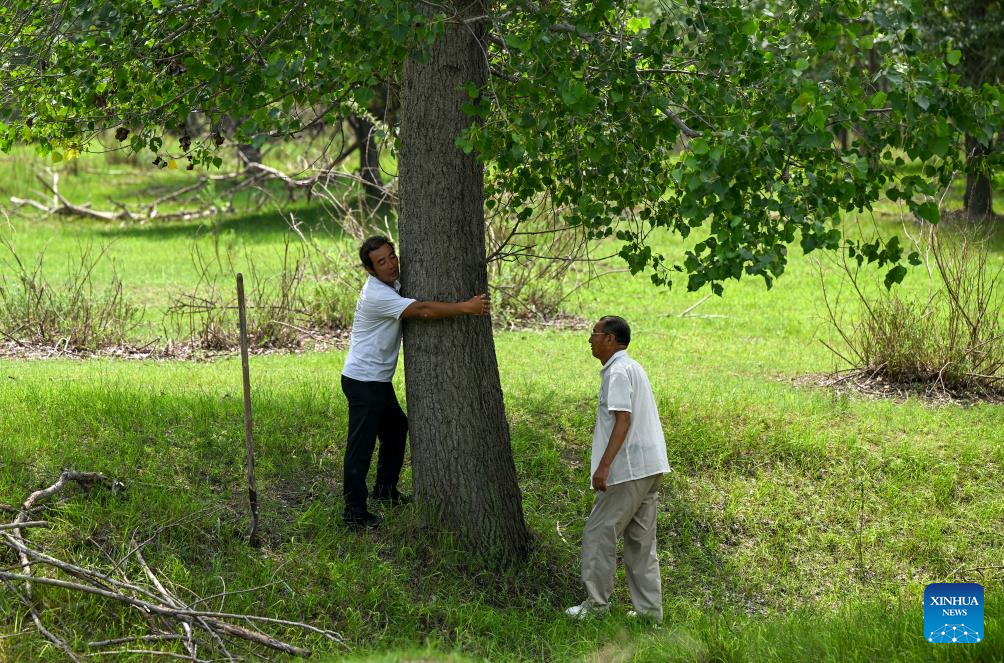
Bai Shun (R) and his son pose for photos with the first tree they planted in Bulteger Gacha, Horqin Left Wing Rear Banner of Tongliao City, north China's Inner Mongolia Autonomous Region, Aug. 2, 2023. Locating in the center of the Horqin Sandy Land, Bulteger Gacha, a small village in Horqin Left Wing Rear Banner of Tongliao City, used to suffer from desertification. Since 2002, Bai Shun, a local Mongolian farmer, has led his family take root in this village and devote themselves to the control of desertification.
The survival rate of planted trees was low at the beginning due to lack of experience and fund. In order to improve the survival rate, Bai Shun sold his possessions to raise money and made every effort in raising saplings, pulling fences, planting sand-fixing grass, patrolling and consulting experts.
With continuous hard work of Bai Shun's family, the sandy land gradually disappeared. In the past 20 years, 1,200 mu (about 80 hectares) of sandy land has been turned into forests, and hundreds of hectares of farmland has been protected.
At the age of 73, Bai Shun still holds high morale in defeating desertification. "Protecting the ecological environment is as important to me as protecting my own life. I want to conquer the sandy land and protect my home," he said. (Xinhua/Lian Zhen)
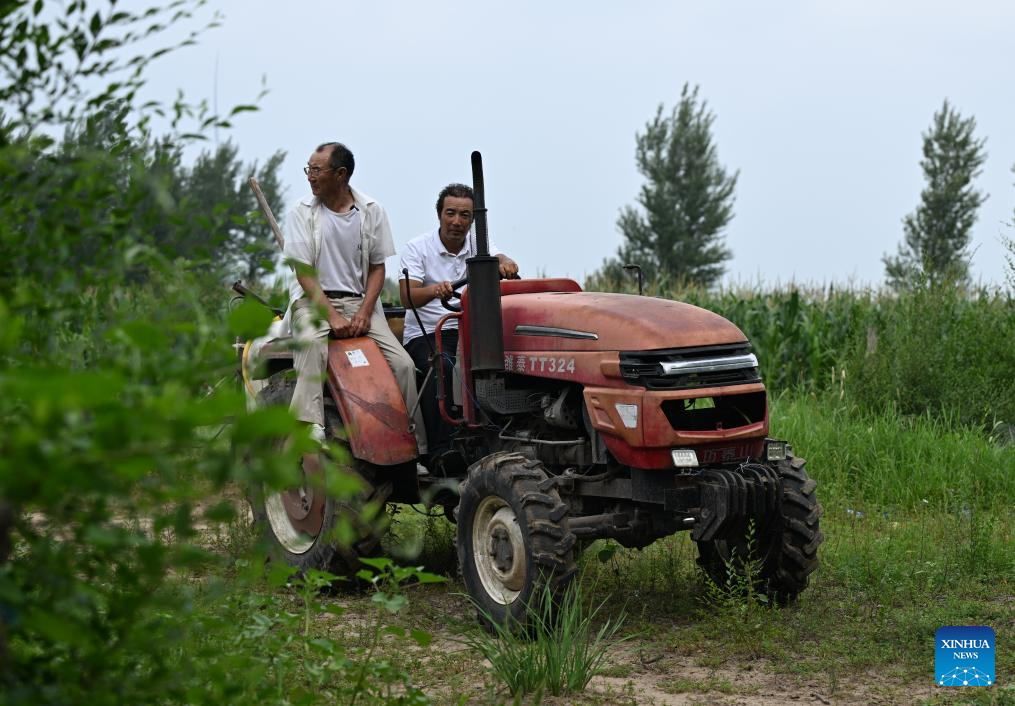
Bai Shun (L) and his son drive a tractor to a forest in Bulteger Gacha, Horqin Left Wing Rear Banner of Tongliao City, north China's Inner Mongolia Autonomous Region, Aug. 2, 2023. Locating in the center of the Horqin Sandy Land, Bulteger Gacha, a small village in Horqin Left Wing Rear Banner of Tongliao City, used to suffer from desertification. Since 2002, Bai Shun, a local Mongolian farmer, has led his family take root in this village and devote themselves to the control of desertification.
The survival rate of planted trees was low at the beginning due to lack of experience and fund. In order to improve the survival rate, Bai Shun sold his possessions to raise money and made every effort in raising saplings, pulling fences, planting sand-fixing grass, patrolling and consulting experts.
With continuous hard work of Bai Shun's family, the sandy land gradually disappeared. In the past 20 years, 1,200 mu (about 80 hectares) of sandy land has been turned into forests, and hundreds of hectares of farmland has been protected.
At the age of 73, Bai Shun still holds high morale in defeating desertification. "Protecting the ecological environment is as important to me as protecting my own life. I want to conquer the sandy land and protect my home," he said. (Xinhua/Lian Zhen)



